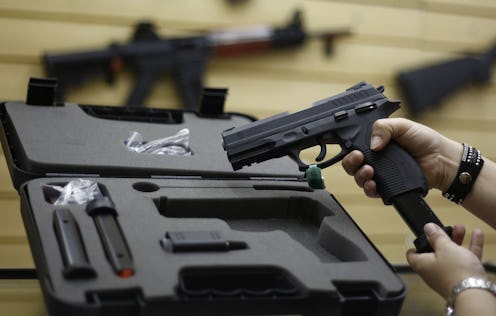News
North Carolina's Gun Laws Allow For Open Carry
The police-involved shooting of Keith Lamont Scott shook the nation this week, as hundreds joined protests his death, and many more followed the case raptly online. According to the Charlotte-Mecklenburg Police Department, Scott was carrying a gun at the time of his death, and the department released pictures of a gun reportedly found at the scene. However, Scott's family maintains their claims that he didn't have a gun. But North Carolina's gun laws show that it wouldn't have mattered if Scott had a gun or not, because his having a gun out wouldn't have broken state law.
North Carolina is an open carry state, meaning that whether or not Scott was carrying a gun openly, he didn't break the law. That wouldn't have been enough reason for the police to approach him, and it certainly wouldn't have been enough on its own to justify his being shot. The dashboard camera and body camera footage released by the police department doesn't directly show Scott pointing a gun at officers either, which Charlotte-Mecklenburg Police Chief Kerr Putney confirmed during a press conference on Saturday. “There was no definitive visual evidence that he had a gun in his hand and that he pointed it at an officer. That I did not visually see in the video," Putney said.
Overall, North Carolina has somewhat strict regulations on handguns, but not similarly for rifles and shotguns. While handgun purchasers have to have both a permit to purchase and a permit to carry, rifle and shotgun owners don't. Securing that permit is a process that's left up to the discretion of the local sheriff, as outlined in the state Department of Justice's official firearms laws. Those laws state that before issuing a permit, the sheriff must decide if "the applicant is of good moral character" and wants the gun for protection, target shooting, collection, or hunting. If you are openly carrying a handgun, though, you don't need a concealed carry permit.
However, the very fact of a black man having a gun is often seen as a threat of violence toward police in and of itself. In an article for The Washington Post, columnist Eugene Robinson pointed out the discrepancy between how police respond to white people with guns and black people with guns. "If you are a black man in America, exercising your constitutional right to keep and bear arms can be fatal," wrote Robinson. "North Carolina, after all, is an open-carry state. A citizen has the right to walk around armed if he or she chooses to do so. The mere fact that someone has a firearm is no reason for police to take action."
Ultimately, it doesn't matter if Scott had a gun on him or not. The fact of the matter is that Scott was legally allowed to openly carry a gun in his state, and just the fact that he allegedly had a gun shouldn't have been justification for the police to engage with him. As the facts continue to come out, the evidence may reveal new factors in the case, but one thing is clear — Scott's alleged possession of a gun is not an issue, nor should it have been during the encounter.
